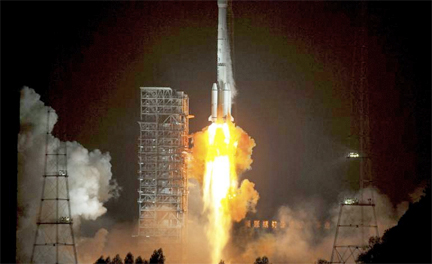
Artistic rendition of the Tupac Katari satellite.
[SatNews] Bolivian state-owned telecommunications company Entel has established contact with the Tupac Katari satellite, which the Andean nation placed into orbit in December via a Chinese Long March launch vehicle, President Evo Morales said.
The first contact with the satellite was made on Tuesday, Morales said during a military ceremony in the central region of Cochabamba.
"We have good news ... our Entel has had successful contact with our communications satellite, Tupac Katari. We are very happy, proud of our satellite," Morales said Wednesday.
The satellite is expected to be fully operational in March, the president said.

The Tupac Katar satellite launch in China.
The Tupac Katari satellite, or TKSat-1, named for the Indian leader who staged a rebellion against the Spanish Empire in the 18th century, was built by China Great Wall Industry Corporation, or CGWIC, an aerospace company that is a unit of China Aerospace Science and Technology Corporation. The TKSat-1 was manufactured under the terms of a cooperation agreement signed by Bolivia and China in 2009. The $302 million project was largely financed with a loan from the China Development Bank and the Tupac Katari was developed from the Chinese-made DFH-4 platform. The satellite was launched on Dec. 20 from China's Xichang Satellite Launch Center in Sichuan province.
The TKSat-1 entered geostationary orbit last weekend and China turned control of the satellite over to Bolivia. The satellite will be operated by ground control stations in the Bolivian regions of La Paz and Santa Cruz staffed by civilian and military personnel trained in China.
The TKSat-1 weighs 5,200 kilos (11,453 pounds) and is expected to function for 15 years. The satellite will improve telecommunications and Internet access in isolated rural areas of Bolivia. The TKSat-1 is also equipped to relay radio and television signals, and to provide service for neighboring countries in South America. Bolivia expects to save around $15 million as it will no longer need to lease capacity on foreign-owned satellites.

